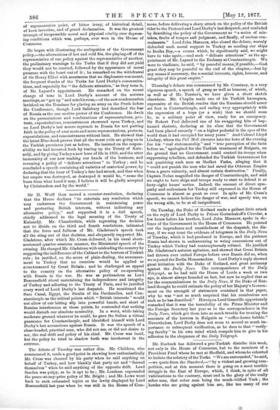Sir H. Wolff then moved a counter-resolution, declaring that the
House declines "to entertain any resolution which may embarrass the Government in maintaining peace and protecting British interests, without indicating any alternative policy," and supported it in a dull speech, chiefly addressed to the legal meaning of the Treaty of Kainardji. Mr. Chamberlain, while regretting the decision not to divide on the third and fourth resolutions, intimated that the force and fullness of Mr. Gladstone's speech took all the sting out of that decision, and eloquently supported Mr. Gladstone, after which Mr. Cross delivered, in his usual short- sentenced quarter-sessions manner, the Ministerial speech of the evening. He charged Mr. Gladstone with misleading the country by suggesting the indifference of the Cabinet to the horrors of Turkish rule ; he justified, on the score of plain-dealing, the announce- ment to Turkey that no coercion would be applied or countenanced by Great Britain ; and he challenged an appeal to the country on the alternative policy of co-operating with Russia in the war. He was as pertinacious as Lord Beaconsfield about maintaining the independence and integrity of Turkey and adhering to the Treaty of Paris, and he justified every word of Lord Derby's last despatch. He mentioned the Suez Canal, Egypt, the Straits of the Dardanelles, and Con- stantinople as the critical points which " British interests " would not allow of our letting slip into powerful hands, and short of Russian interference at these points, he contended that nothing would disturb our absolute neutrality. In a word, while taking moderate ground wherever he could, he gave the Sultan a virtual guarantee for Constantinople, and identified himself with Lord Derby's last accusations against Russia. It was the speech of a clear-headed, practical man, who did not see, or did not desire to see, the real drift and policy of his chief. Mr. Cross was lucid, but the policy he tried to shadow forth was incoherent in the extreme.


































 Previous page
Previous page